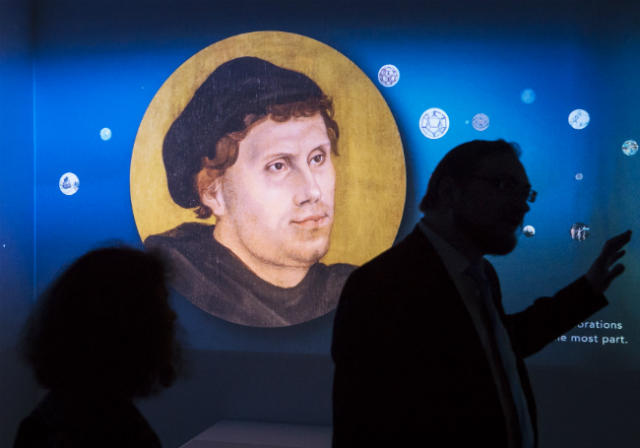Visitors stand in front of a video installation displaying a portrait of Martin Luther in Wittenberg, Germany. Credit: AP Photo/Jens Meyer
It’s easy to look at our social networks and think that they’re completely unprecedented. After all, it wasn’t like Abraham Lincoln could see how many likes he was getting on Facebook. But according to Niall Ferguson, that’s a narrow view of history. Ferguson, author of the new book, The Square and the Tower: Networks and Power, from the Freemasons to Facebook, explores how networks have altered the course of human events, and tells us what we can learn about our own social networks by examining the networks of the past.
Three Takeaways:
- Ferguson sees history as a push and pull between hierarchies and networks. Some technologies, like the printing press, have allowed networks to gain the upper hand. (Consider the rise of Protestantism in opposition to the hierarchical Catholic Church.) Others, like railroads, have reinforced the power of hierarchies.
- The social networks of today can learn from those in the past. “Even small social networks will polarize,” Ferguson says. “You’re not going to create a happy-clappy global community just by connecting everyone.” The printing press encouraged polarization, much like today’s networked platforms.
- Ferguson also believes that this polarization problem doesn’t have an easy fix. He thinks that there’s a fantasy that these social networks can devise a solution by tweaking their algorithms and hiring a few content moderators. According to Ferguson, this fantasy could disappear once the government realizes the threat these social networks truly pose to our democracy.
More Reading:
- Networks like the freemasons might have been important, but they didn’t actually run the world. For insight into why some people believe that small networks actually run the world, here's an interview with Rob Brotherton about the history and psychology of conspiracy theories (and why we totally love to buy into them).
- 2017 was the 500th anniversary of the Protestant Reformation. NPR takes a look at the split.
- It's not just Niall Ferguson who's worried about the effects of social networks. The New York Times reports that early Facebook and Google employees are also deeply concerned.


